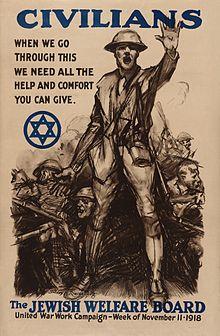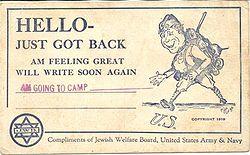The National Jewish Welfare Board (JWB) was formed on April 9, 1917, three days after the United States declared war on Germany, in order to support Jewish soldiers in the U.S. military during World War I.[1] The impetus for creating the organization stemmed from Secretary of War, Newton Baker and Secretary of Navy, Josephus Daniels.[1] The organization was also charged with recruiting and training rabbis for military service, as well as providing support materials to these newly commissioned chaplains. The JWB also maintained oversight of Jewish chapel facilities at military installations.[2]
In 1921, several organizations merged with the JWB to become a national association of Jewish community centers around the country in order to integrate social activities, education, and active recreation. These merged organizations included the YWHA, YMHA, and the National Council of Young Men's Hebrew and Kindred Association.[2][3]
In 1941, in a response to a mandate from President Franklin D. Roosevelt, six private organizations - the YMCA, YWCA, the National Jewish Welfare Board, the Traveler's Aid Association and the Salvation Army were challenged to handle the on-leave morale and recreational needs for members of the Armed Forces. The six organizations pooled their resources and the United Service Organizations, which quickly became known as the USO, was incorporated in New York on February 4, 1941.[4]
The organization is now the JWB Jewish Chaplains Council, part of JCC of North America.[5] The Council sends religious artifacts and supplies for Jewish holidays, including Passover Seder kits, Hanukka candles, four species for Tabernacles, and more.[6]
Related links
- National Jewish Welfare Board Records; I-337; American Jewish Historical Society, Boston, MA and New York, NY.
- National Jewish Welfare Board Records; I-298; American Jewish Historical Society, Boston, MA and New York, NY.
- National Jewish Welfare Board Military Chaplaincy Records; I-249; American Jewish Historical Society, Boston, MA and New York, NY.
- National Jewish Welfare Board, Army-Navy Division Records; I-180; American Jewish Historical Society, Boston, MA and New York, NY.
- National Jewish Welfare Board, Bureau of War Records; I-52; American Jewish Historical Society, Boston, MA and New York, NY.
References
- ^ a b Bridger, David; Samuel Wolk, eds. (1976). The New Jewish encyclopedia. New York: Behrman House. p. 339. ISBN 0874411203.
- ^ a b Bridger 1976, p. 340.
- ^ Borish, Linda J. (2002). "Women, sport, and American Jewish identity in the late nineteenth and early twentieth centuries". In Timothy Chandler; Tara Magdalinski (eds.). With God on their Side: Sport in the Service of Religion. Routledge. ISBN 1134511663.
- ^ Yelin, Emily (2010). Our Mothers' War: American Women at Home and at the Front During World War II. Simon and Schuster. p. 86. ISBN 1439103585.
- ^ JWB Jewish Chaplains Council
- ^ Rivera, By John. "Amid war, a pause for faith". baltimoresun.com. Retrieved 2019-11-17.

